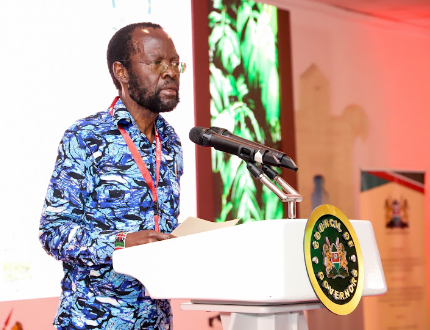Judges and magistrates must possess a deep understanding of emerging legal issues related to the environment, land use planning, and carbon markets to make informed and effective judicial decisions.
Environment and Land Court Principal Judge Oscar Angote emphasized this on Wednesday, noting that rapid population growth and urbanization have exacerbated environmental challenges such as climate change, biodiversity loss, and pollution.
“Addressing these challenges requires a multifaceted approach that integrates legal, scientific, and community-based strategies,” Angote stated.
He made these remarks during the opening of a three-day training workshop for Environment and Land Court judges in Ukunda, focusing on emerging issues in environmental and land use planning and carbon markets.
The workshop will cover topics such as the landscape of carbon markets, existing challenges and opportunities, the judiciary’s roles and responsibilities within carbon markets, and how judicial actions can shape these markets.
Additionally, discussions will address the importance of partnerships and collaboration on climate justice and the role of alternative justice systems in handling environmental and land cases.
The training will explore how the Judiciary can facilitate the Financing Locally-Led Climate Action program and support its effective implementation in Kenya. A key focus will be the use of Geographic Information Systems (GIS) in planning and spatial decision-making, highlighted by a case study from Vihiga County demonstrating GIS’s practical benefits.
Judges and magistrates will also examine a case study presented by the Northern Rangelands Trust (NRT) on carbon trading, providing practical insights and examples of successful carbon trading practices. NRT encompasses 45 member community conservancies, with 14 involved in the Northern Kenya Rangelands Carbon Project.
In 2017, these conservancies authorized NRT to sell carbon credits. By 2023, the Carbon Community Fund, a community-owned and operated fund, disbursed KSh 90,011,244 to the 14 participating conservancies. This project has supported 13,122 students in secondary schools and higher education institutions. Overall, KSh 322,979,438 was disbursed to all community conservancies participating in the Northern Kenya Rangelands Carbon Project.
Kisumu Governor Anyang Nyong’o, chairman of the Lands, Housing, and Urban Development Committee of the Council of Governors, highlighted the pivotal role of the Environment and Land Court in shaping sustainable development and ensuring equitable access to land. Nyong’o emphasized that land is not just a physical resource but a cornerstone of livelihoods, cultural identity, and economic progress.
He noted that rapid urbanization, population growth, and environmental challenges have made land management and use increasingly complex. Judges and magistrates, he said, are at the forefront of interpreting laws, adjudicating disputes, and guiding decisions that directly impact landscapes and communities.
Nyong’o underscored that effective land management and planning are crucial for sustainable development, social equity, legal certainty and security, environmental conservation, and prudent urban planning and infrastructure.
Council of Governors CEO Mary Mwiti acknowledged the strides made since the advent of devolution but pointed out ongoing challenges, such as attempts to recentralize powers and resources, which undermine the ability of county governments to deliver services effectively.
These challenges often manifest through legislative amendments, budgetary constraints, and orders disguised as national strategic directions. She expressed gratitude for the judiciary’s steadfast support and urged continued vigilance in safeguarding the autonomy of county governments, reinforcing the foundations of devolution as a cornerstone of Kenya’s democratic and developmental journey.
Mwiti also noted that devolved units face persistent challenges due to climate change, necessitating a deeper understanding of environmental and climate issues, including those that exacerbate existing vulnerabilities.
Environment PS Festus Ng’eno stated that the state has established a legal framework to guide domestic and international investors, boost market confidence, and ensure compliance with international obligations.



